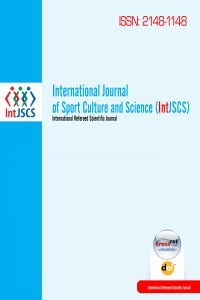Investigating the Relationship between Athletes' Psychological Needs Thwarting and their Psychological Performance
Investigating the Relationship between Athletes' Psychological Needs Thwarting and their Psychological Performance
Performance, Psychological Needs, Psychological Performance.,
___
- Abiş, S. (2022). Uzun mesafe atletlerinin zihinsel dayanıklılık, Psikolojik performans ve hedef yönelimlerinin Koşu performansı üzerine etkisi, (yüksek lisans tezi), Ondokuz Mayıs Üniversitesi, Lisansüstü Eğitim Enstitüsü.
- Akbağ, M. Ümmet, D. (2017). Predictive role of grit and basic psychological needs satisfaction on subjective well-being for young adults. Journal of Education and Practice, 8(26), 127-135.
- Aras, G. (2019). Farklı lise türlerinde öğrenim gören öğrencilerin beden eğitimi ve spor dersine karşı tutumları ile kişilik özellikleri arasındaki ilişki. (Yüksek Lisans Tezi). Sakarya: Sakarya Uygulamalı Bilimler Üniversitesi, Lisansüstü Eğitim Enstitüsü.
- Aşçı, F. H., Çağlar, E., Eklund, R. C., Altıntaş, A., and Jackson, S. (2007). Durumluk ve sürekli optimal performans duygu durum-2 ölçekleri'nin uyarlama çalışması. Spor Bilimleri Dergisi, 18(4), 182-196.
- Atıcı, A. R. (2023). Ortaokullarda Öğrenim Gören Mülteci ve Göçmen Çocukların Motor Beceri Düzeylerinin ve Beden Eğitimi Temel Psikolojik İhtiyaçlarının İncelenmesi (Doktora Tezi). Aksaray Üniversitesi Sosyal Bilimler Enstitüsü.
- ISSN: 2148-1148
- Başlangıç: 2013
- Yayıncı: Uluslararası Bilim Kültür ve Spor Derneği (UBİKS)
The Problems of Transferring Athletes in Sports Multi-events
Muhammad Bagus BİNATHARA, Muhammad Hamid ANWAR
Tokyo 2020 Yaz Olimpiyat Oyunlarındaki artistik yüzme teknik element puanlarının analizi
Investigation of Physiological and Kinematic Parameters of Tennis Players During the Simulated Games
